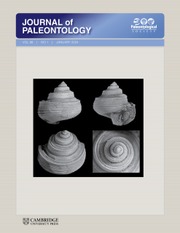Crossref Citations
This article has been cited by the following publications. This list is generated based on data provided by
Crossref.
Chatzimanolis, Stylianos
Grimaldi, David A.
Engel, Michael S.
and
Fraser, Nicholas C.
2012.
Leehermania prorova, the Earliest Staphyliniform Beetle, from the Late Triassic of Virginia (Coleoptera: Staphylinidae).
American Museum Novitates,
Vol. 3761,
Issue. 3761,
p.
1.
Cai, Chen-yang
Thayer, Margaret K.
Huang, Di-ying
Wang, Xiang-dong
and
Newton, Alfred F.
2013.
A basal oxyteline rove beetle (Coleoptera: Staphylinidae) from the Early Cretaceous of China: Oldest record for the tribe Euphaniini.
Comptes Rendus Palevol,
Vol. 12,
Issue. 3,
p.
159.
Cai, Chenyang
Yan, E.V.
and
Vasilenko, D.V.
2013.
First record of Sinoxytelus (Coleoptera: Staphylinidae) from the Urey locality of Transbaikalia, Russia, with discussion on its systematic position.
Cretaceous Research,
Vol. 41,
Issue. ,
p.
237.
Cai, Chen-Yang
Lü, Liang
Caron, Edilson
Bortoluzzi, Sidnei
Newton, Alfred F.
Thayer, Margaret K.
and
Huang, Di-Ying
2016.
First Piestine Rove Beetle in Eocene Baltic Amber (Coleoptera, Staphylinidae, Piestinae).
Journal of the Kansas Entomological Society,
Vol. 89,
Issue. 4,
p.
345.
Lü, Liang
Cai, Chen-Yang
and
Huang, Di-Ying
2017.
The earliest oxyteline rove beetle in amber and its systematic implications (Coleoptera: Staphylinidae: Oxytelinae).
Cretaceous Research,
Vol. 69,
Issue. ,
p.
169.
Yu, Yali
Liu, Zhenhua
Shih, Chungkun
and
Ren, Dong
2019.
Rhythms of Insect Evolution.
p.
337.
Liu, Yuchu
Tihelka, Erik
Thayer, Margaret K.
Newton, Alfred F.
Huang, Diying
Tian, Li
and
Cai, Chenyang
2021.
A transitional fossil sheds light on the early evolution of the Staphylinine group of rove beetles (Coleoptera: Staphylinidae).
Journal of Systematic Palaeontology,
Vol. 19,
Issue. 4,
p.
321.
Liu, Yuchu
Tihelka, Erik
Cai, Chenyang
and
Tian, Li
2022.
The oldest fossil record of Pseudopsinae from the Lower Cretaceous Yixian Formation of northeastern China (Coleoptera: Staphylinidae: Pseudopsinae).
Scientific Reports,
Vol. 12,
Issue. 1,
Chen, Xin-Hui
Newton, Alfred F.
Huang, Diying
Lü, Liang
and
Cai, Chenyang
2023.
Kupakara gen. nov., a new genus of Blediini in mid-Cretaceous amber from northern Myanmar (Coleoptera: Staphylinidae: Oxytelinae).
Cretaceous Research,
Vol. 148,
Issue. ,
p.
105505.
Underwood, K. Dante
Puschendorf, Robert
Bilton, David T.
Hallwachs, Winnie
Janzen, Daniel H.
and
Smith, M. Alex
2024.
Decoding Anotylus (Thomson 1859) Beetle Diversity: DNA and External Morphology Match in Área de Conservaciόn Guanacaste, Costa Rica.
Diversity,
Vol. 16,
Issue. 8,
p.
441.


